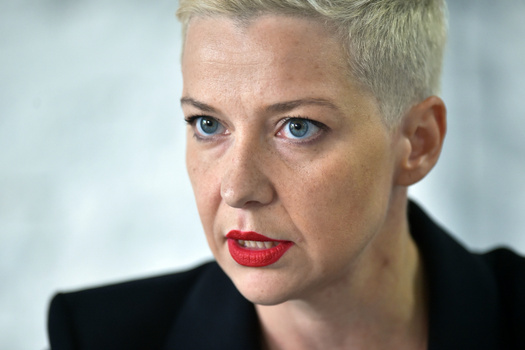
‘Any Belarusian could replace me’ Maria Kolesnikova — the last member standing of the opposition ‘women’s triumvirate’ — says she’s not going anywhere
Мы рассказываем честно не только про войну. Скачайте приложение.
Maria Kolesnikova (Maryia Kalesnikava) was the campaign manager for Victor Babariko (Viktar Babaryka), who was initially expected to be the main challenger in the 2020 Belarusian presidential election, which concluded on August 9. Things turned out otherwise, however. Babariko was arrested and Kolesnikova continued her work on the campaign trail as one-third of the opposition’s “women’s triumvirate” alongside Veronika Tsepkalo (Veronica Tsapkala) and Svetlana Tikhanovskaya (Svyatlana Tsikhanouskaya). Today, Kolesnikova is the only one of these three who remains in Belarus; her two companions fled or were forced out by government pressure. She spoke to Meduza special correspondent Svetlana Reiter about the presidential race, the protests, and why she plans to stay put in Belarus.
On August 11, Svetlana Tikhanovskaya — the main rival to Alexander Lukashenko in last weekend’s presidential election — left Belarus and went to Lithuania. Her campaign says the state authorities pressured her into going. Tikhanovskaya appeared in two videos released on Tuesday. In one shared on her husband’s social media, she said she had no choice in leaving Belarus. In a second video shared on a pro-government Telegram channel, she read from a script without looking at the camera and called on her supporters to cease all protests.
The great Belarusian triumvirate that electrified this year’s presidential race has collapsed. So what does Maria Kolesnikova — the one member who hasn’t left Belarus — plan to do next? “The strategy is pretty clear,” she says. “Now we need to direct all our efforts to helping those who suffered because of the election.” Kolesnikova says this means providing assistance to the polling station workers who risked their own safety to report attempts to pressure them into falsifying voting results in favor of Lukashenko. It also means support for the several thousand people whom police have arrested at protests since Sunday. “And we must help the hundreds of people who are in the hospital now after clashes with the police,” Kolesnikova told Meduza.
She says she last saw Svetlana Tikhanovskaya walking into the central election commissioner’s office in Minsk, escorted by three men (apparently police officers) carrying video equipment. “I didn’t see her again — I only saw, like everyone else, her video message,” says Kolesnikova, explaining that Tikhanovskaya went to the Central Election Commission to file a formal challenge against Sunday’s official election results. “I saw the complaint on the desk in Commissioner Lidia Yermoshina’s office, but I don’t know what happened to this sheet of paper,” Kolesnikova says.
Tikhanovskaya’s challenge was built in part on testimony from multiple election workers who say they witnessed fraud during Sunday’s vote. Kolesnikova could not tell Meduza specifically how many eyewitnesses have come forward, but she says “very many” are ready to speak openly. “That’s what separates this election from all previous races. In past elections, everyone knew there was fraud, but nobody cared. This time, people realized that they’re in the majority and they want to defend their rights and their voice,” says Kolesnikova.
Svetlana Tikhanovskaya and Veronika Tsepkalo left Belarus because they feared for their own safety. Kolesnikova says she supports their decision to go, but she feels “great responsibility for what is happening now in Belarus” and “of course” has no intention of backing down, she told Meduza.
She also refuses to hire bodyguards.
Kolesnikova got her start in politics working with Victor Babariko (Viktar Babaryka), whose presidential candidacy ended in criminal charges and arrest. “[He and his son] have been locked up by the KGB for two months now and we don’t know what’s happening with them. But what did happen didn’t stop me from continuing this work that we started together,” she says.
A concert flutist frustrated with what she calls Belarus’s demeaning state censorship, Kolesnikova says she met Babariko when they worked together at Belgazprombank. “I share his values completely — they’re exactly the same as mine,” she told Meduza. Asked why she believes political tensions have grown so heated in Belarus, Kolesnikova attributes the public’s exhaustion with Lukashenko to his mishandling of the COVID-19 pandemic, the collapse of the Belarusian ruble, and fears about absorption by Russia and the loss of sovereignty. “People were unhappy that the important issue of Belarus’s independence might be decided without their participation,” says Kolesnikova.
She also points out that the president’s dismissive comments about women played a role, as well. Alexander Lukashenko stated blatantly that a woman cannot be president. “Fifty-five percent of the voters in Belarus are women and you can’t even imagine how that enraged them,” says Kolesnikova.
Lukashenko has been in power since 1994 — a fact that makes his presidency feel simultaneously invulnerable and fatigued. Kolesnikova calls this year’s election “an enormous success” because Belarusians now believe for the first time, she says, that they can “change everything.”
Despite these apparent gains and the bravery of the one triumvirate pillar still standing, much about the future remains frightening. “I only hope that there will be no bloodshed by the authorities. That causes me personal pain because I’m simply scared to look when I see what’s happening on the streets,” says Kolesnikova, who insists that the opposition movement is stronger than any one person, herself included. “Any Belarusian who takes responsibility for their own life and takes the life of Belarus into their own hands could replace me,” she says.
Interview by Svetlana Reiter
Summary by Kevin Rothrock
(1) Svetlana Tikhanovskaya
According to the state’s official election tally, long-time incumbent President Alexander Lukashenko (Alyaksandr Lukashenka) won an overwhelming 80 percent of all votes in the election, while just 10 percent went to Tikhanovskaya, whose campaign has refused to recognize the results.